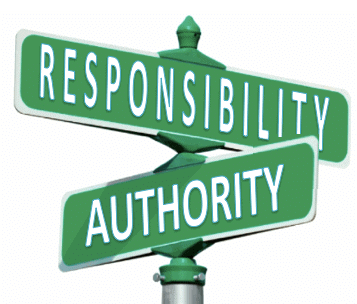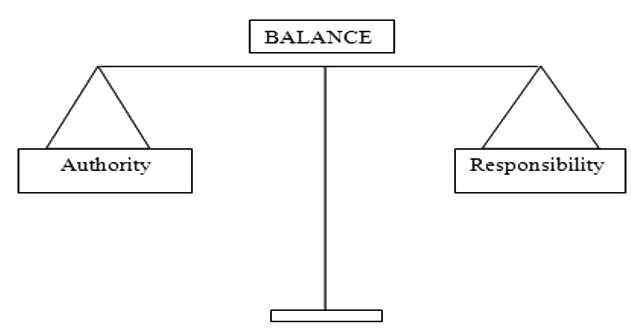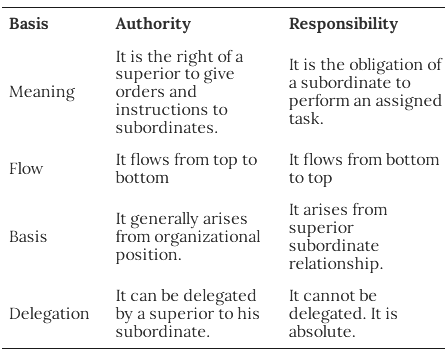Responsibility & Authority: Delegation of Authority & Decentralization | Crash Course for UGC NET Commerce PDF Download
| Table of contents |

|
| Introduction |

|
| Authority |

|
| Responsibility |

|
| Difference between Authority and Responsibility |

|
| Delegation of Authority |

|
Introduction

Management involves a hierarchical system where organizing is a fundamental function that provides structure to this system. Organizing is essentially the backbone of management. The term ‘organization’ is widely used to describe both a group of people and the structure of relationships within it.
Louis Allen defines organizing as "the process of identifying and grouping work to be performed, defining and delegating responsibility and authority, and establishing relationships to enable people to work most effectively together to achieve objectives."
Allen’s definition highlights that organizing is centered around defining responsibilities, delegating authority, and establishing relationships between authority and responsibility. An organization is characterized by a formal structure with clear responsibilities and defined authority, which determines the flow of both authority and responsibility.
Authority
- Authority is crucial to managerial functions, representing the right or power assigned to an executive to achieve specific organizational goals. It encompasses the ability to direct others to accomplish tasks and is essential for managers to effectively oversee and guide their subordinates.
- Authority includes making decisions, issuing orders, and assigning tasks, such as managing budgets, planning, issuing materials, hiring, or ordering supplies. Without authority, a manager cannot ensure tasks are completed by others.
- Henry Fayol describes authority as “the right to give orders and the power to exact obedience.”
- Koontz and O’Donnell define authority as “the power to command, to act, or to refrain from acting in ways deemed by the authority holder to enhance organizational or departmental performance.”
- Authority enables managers to fulfill their responsibilities. Without adequate authority, a manager cannot perform their duties effectively. Authority allows for decision-making, commanding, and controlling subordinates to execute policies and programs. It is a formal power granted by superiors that facilitates compliance with orders. Authority is a downward-flowing concept: it is delegated from above but must be accepted by subordinates below.
Characteristics of Authority
- Legitimacy: Authority is legitimate power vested in an individual by virtue of their position within the organization. For authority to be effective, it must be legitimate; otherwise, it will not be obeyed.
- Dominance: Authority allows an individual or group to exercise dominance over others. It defines superior-subordinate relationships and typically decreases as one moves down the organizational hierarchy.
- Accountability: The person with authority is accountable to their superior for fulfilling obligations using that authority. Accountability is a crucial aspect of authority, ensuring performance meets established standards.
- Downward Flow: Authority flows downward in the hierarchy. Higher organizational positions hold more authority, while authority decreases as one moves lower. Authority establishes superiority.
- Delegation of Authority: Authority can be delegated from higher to lower levels to share the workload of superiors. However, while authority can be delegated, responsibility for performance remains with the delegator.
- Parity of Authority and Responsibility: Authority should be matched with responsibility. According to Fayol’s principles, authority and responsibility must be balanced. A manager needs adequate authority to fulfill their responsibilities effectively. If authority exceeds responsibility, it may lead to autocratic behavior and misuse of power. Conversely, if responsibility exceeds authority, it can cause frustration and hinder task completion. For example, if a manager is responsible for purchasing raw materials but lacks authority to make financial decisions, it would frustrate the manager as they cannot achieve their goals effectively, despite being accountable for them.

Difference Between ‘Authority’ and ‘Power’
Although the terms authority and power are often used interchangeably, they represent distinct concepts. Power is a broader term compared to authority. Koontz et al. define power as “the ability of individuals or groups to influence or affect the beliefs or actions of others.” Here are the key differences between authority and power:
Right to Command:
- Authority: Represents the right to command others.
- Power: Refers to the ability to command or influence.
Basis of Exercise:
- Authority: Arises from a formal organizational position.
- Power: Is exercised by individuals regardless of their formal position.
Nature:
- Authority: Is legitimate and tied to a specific organizational position. It is institutional and comes with the role.
- Power: Is personal and not necessarily institutional. It can stem from various sources such as political influence, financial resources, or personal attributes.
Hierarchy:
- Authority: Typically increases with higher organizational positions.
- Power: Does not necessarily correlate with organizational hierarchy and can be exerted in various directions.
Flow:
- Authority: Flows downward from higher to lower levels in the hierarchy.
- Power: Can flow in all directions, not restricted by hierarchical levels.
Responsibility
Responsibility refers to the duty to complete assigned tasks. According to Fayol, authority is derived from responsibility. Managers assigned responsibilities should also be granted the necessary authority to fulfill their duties.
Theo Haimann describes responsibility as “the obligation of a subordinate to carry out duties as required by their superior.”
McFarland defines responsibility as “the duties and activities assigned to a position or an executive.”
Features of Responsibility
- Assigned Duty: Responsibility pertains to the tasks assigned to individuals.
- Obligation: It represents the duty of a subordinate to perform assigned tasks properly.
- Relationship: It stems from the superior-subordinate relationship.
- Flow: Responsibility flows upward; subordinates are accountable to their superiors.
- Non-delegable: Responsibility cannot be delegated.
- Accountability: The person who accepts responsibility is accountable for fulfilling the assigned duties.
- Authority: Effective performance of responsibilities is challenging without adequate authority.
Difference between Authority and Responsibility

Delegation of Authority
- The adage "Nothing is impossible if you can delegate" highlights the importance of delegation in achieving remarkable results.
- Delegation involves transferring duties and responsibilities from a superior to a subordinate, along with the necessary authority to complete the assigned tasks.
- A crucial aspect of delegation is that while a superior can delegate authority to a subordinate, the ultimate responsibility for the task remains with the superior.
- The superior remains accountable to higher management for the performance of their subordinates.
- E.F.L. Brech defines delegation as "a process of sharing one or more elements of the management process—command, planning, coordination, and control."
- He emphasizes that delegation is not just about issuing instructions but about distributing part or all of the executive's responsibilities to others.
- Since a manager alone cannot handle all tasks, delegation expands their capacity by distributing the workload.
- Without delegation, organizational structures become ineffective, and management becomes impractical.
- Delegation starts with assigning responsibilities to subordinates, along with granting them the necessary authority to perform the tasks effectively.
- The manager charges the subordinate with accountability for the assigned work, which constitutes the process of delegation.
- Effective delegation involves balancing responsibility, authority, and accountability.
Merits of Delegation
- Reduces Workload: Delegation allows a manager to reduce their workload by assigning tasks to subordinates, enabling them to focus on more critical responsibilities.
- Trains Subordinates: By delegating tasks, managers help develop their subordinates’ skills, preparing them for future roles and responsibilities.
- Enhances Management Efficiency: Delegation helps managers concentrate on significant issues by transferring routine tasks to subordinates, thus improving overall management efficiency.
- Boosts Responsibility: Delegation motivates subordinates by recognizing their abilities and entrusting them with responsibilities, which can enhance their performance and job satisfaction.
- Prevents Delays: Delegation facilitates timely decision-making by allowing superiors to focus on major issues while subordinates handle less critical tasks, thus avoiding delays.
- Builds Management Hierarchy: Effective delegation establishes a clear superior-subordinate relationship, which is essential for a functioning management hierarchy and strengthens relationships between managers and their teams.
Difficulties in Delegation
Obstacles to effective delegation can arise both from superiors and subordinates.
Challenges for Superiors:
- Lack of Trust: Superiors may hesitate to delegate due to a lack of trust in their subordinates' abilities.
- Fear of Better Performance: Superiors might fear losing authority or being overshadowed by more capable subordinates.
- Fear of Losing Control: Delegation can make superiors feel they are losing control over their subordinates.
- Lack of Time: Busy schedules may prevent superiors from dedicating time to delegate tasks properly.
- Uncertainty About How to Delegate: Superiors may struggle with how to delegate effectively.
Challenges for Subordinates:
- Fear of Criticism: Subordinates may worry about receiving criticism if they make mistakes.
- Lack of Self-Confidence: Low confidence can hinder a subordinate’s willingness to take on delegated tasks.
- Decision-Making Difficulties: Subordinates might struggle with making decisions independently.
- Lack of Information: Insufficient information can impede effective performance of delegated tasks.
- Interference by Superiors: Excessive interference by superiors can undermine a subordinate's authority.
- Poor Superior-Subordinate Relationships: Strained relationships can affect the delegation process.
- Absence of Positive Incentives: Lack of incentives can demotivate subordinates from embracing delegated responsibilities.
Principles of Delegation
To ensure effective delegation, consider the following principles:
- Proper Planning: Delegation should be well-planned with clear objectives and functions. This clarity ensures that everyone understands their roles and the authority required.
- Reward Excellence: Successful delegation should be rewarded to foster a supportive environment for effective delegation.
- Select Suitable Subordinates: Choose subordinates whose skills and qualifications align with the tasks and authority being delegated.
- Maintain Authority-Responsibility Balance: Ensure that authority and responsibility are aligned. A person cannot be held accountable for tasks without the appropriate authority.
- Establish Accountability: Clearly define the subordinate’s accountability for achieving results. For example, a sales manager responsible for increasing sales should have the authority to hire, pay wages, and offer incentives within set limits.
- Ensure Unity of Command: Ensure that each subordinate reports to only one superior to avoid confusion and conflict.
- Maintain Communication: Keep open and continuous communication between superiors and subordinates to provide necessary information and feedback.
- Avoid Interference: Allow subordinates to use their delegated authority freely without excessive interference. Superiors should offer guidance and support but not micromanage.
Delegation Process
The delegation process involves several steps:
- Assign Responsibility: Clearly define what is expected from the subordinate.
- Grant Authority: Provide the subordinate with the necessary authority to perform the tasks.
- Create Accountability: Ensure the subordinate is answerable for the outcomes of their tasks.
This structured approach to delegation ensures that responsibilities are effectively managed and that the organizational goals are met.
Elements of Delegation
Delegation comprises three key elements:
Responsibility: Responsibility refers to the obligation of an individual to complete assigned tasks. The delegation process starts when a manager transfers certain duties to subordinates. Once duties are delegated, the subordinate is responsible to the manager for the performance of those tasks. However, the manager retains ultimate responsibility for the outcomes of the delegated tasks to their own superior. This creates two types of responsibility:
- Operational Responsibility: The responsibility of the subordinate (delegatee) to the superior (delegator).
- Ultimate Responsibility: The responsibility of the superior to their own superior for the achievement of goals. If the subordinate fails to meet their obligations, the superior remains accountable and cannot use the subordinate’s failure as an excuse. Therefore, responsibility is absolute and flows upward.
Authority: Authority is the power to make decisions necessary for carrying out assigned responsibilities. To ensure that responsibilities are effectively met, employees need adequate authority. Therefore, when responsibilities are delegated, corresponding authority is also granted to ensure the smooth execution of tasks.
Accountability: Accountability means being liable for specific actions or outcomes. This liability arises because the organization provides the necessary authority to perform responsibilities. Accountability ensures that employees achieve desired results and allows performance to be measured and compared against established standards. Like responsibility, accountability is absolute and cannot be transferred or delegated. A superior remains accountable to their own superior even after delegating tasks.
Features of Accountability:- Accountability involves being answerable for achieving expected results.
- Accountability cannot be delegated or passed on.
- Like responsibility, accountability flows upward.
- Accountability is distinct from blame.
- Authority, Responsibility, and Accountability are interrelated, as illustrated in Figure 3.
To establish an effective accountability system:
- Responsibilities must be clearly defined so that employees understand what is expected of them.
- Adequate authority should be provided to meet the assigned responsibilities.
- Individual performance should be measured.
- Individuals should be held accountable for their performance.
- Accountability standards should be consistently applied at all levels.
Summary
For effective organization, Authority, Responsibility, and Accountability must be aligned. Authority flows downward, while Responsibility and Accountability flow upward. Accountability ensures that individuals are held answerable for their performance. Delegation allows superiors to distribute authority to subordinates, but the superior remains accountable to their own superior for the performance of the delegated tasks. Accountability is absolute and cannot be avoided by merely delegating authority.
|
157 videos|236 docs|166 tests
|
FAQs on Responsibility & Authority: Delegation of Authority & Decentralization - Crash Course for UGC NET Commerce
| 1. What are the key characteristics of authority in an organization? |  |
| 2. What are the principles of authority in management? |  |
| 3. What are the advantages of delegation of authority in management? |  |
| 4. What are some common difficulties faced in the process of delegation of authority? |  |
| 5. How does decentralization of authority contribute to organizational structure? |  |















